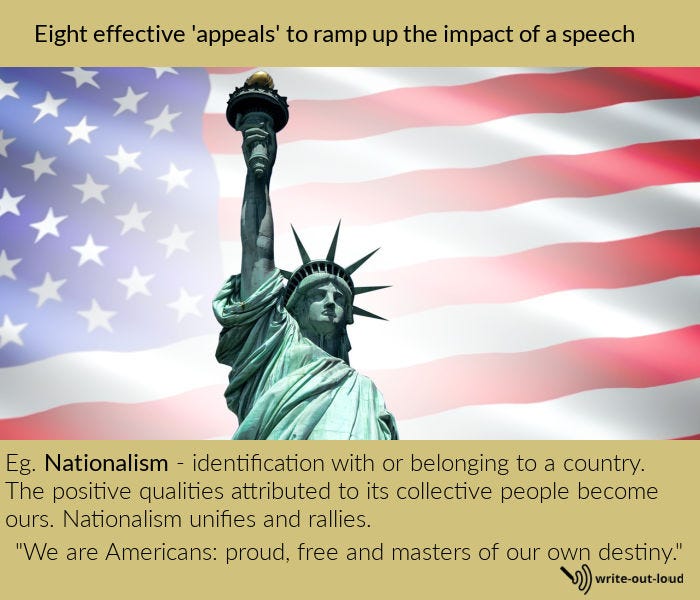How to make your speech more appealing
8 effective appeals commonly used by master persuaders and advertisers
Have you ever wondered how to make a speech more appealing? Or why what is appealing to one audience is repellent to another?
Here's a list of eight effective 'appeals' that are commonly used by master persuaders and advertisers, to ramp up the impact of their messages. Once you’re familiar with them, you can mix and match them to fit your audience and speech purpose.
An aptly chosen appeal acts as a touchstone setting off a supportive ripple of associated ideas, images and feelings in the minds of your audience.
Tradition
This appeal evokes historical patterns of behavior or events. Their longevity is honored and respected. Examples are found at international, national, region and family levels. E.g. Coming together for celebrations - Thanksgiving or Christmas, the handing down of names from one generation to the next, marriage customs...
Love
This appeal is universal. We all feel it. A potent example is: "If you truly want the best for your children, you'll ...” {Insert whatever will tug at the heart strings of your audience in place of the ellipsis. For e.g., “…give them the best education possible.”}Nationalism
This appeal is based on identification with or belonging to a country. The positive qualities attributed to its collective people become ours. Nationalism unifies and rallies. Example: "We are Americans: proud, free and masters of our own destiny.”
Authority
This appeal 'borrows' from significant others to give an argument or idea weight and validity. Endorsement advertising is one form of its expression. Afterall if 'BIG' Name Star says it's good, it must be. Other forms are expert witnesses, or leading authorities in the particular field under discussion.
Fear
Appealing to fear, real or otherwise, taps into the seemingly bottomless well of anxiety we all share. What if it all goes wrong?
Example: “Do you hear that screech of brakes? Have you buckled up your children?”
Fears come in all shapes and sizes: fear of the unknown, rejection, flying, dark, disease, famine, food, future and even public speaking! Fear of what 'might' happen is a powerful motivator.Self-Interest
This appeal goes to the core of 'What's In It For Me?' What does the individual stand to gain or benefit by following through on a course of action? Will they earn more money, kudos, respect...?
Like it or not self-interest drives decision making. In some it is more dominant than others.
Pride
There are numerous variations on this appeal: national, family, male, female, personal... What makes it compelling is that it appeals to an ideal image of ourselves, our family, manhood, or country etc. Being asked to take pride is an invitation to step up, to become that image, to do something worthy of being proud of!
Fashion
This appeal thrives because of our desire to keep up to date with the newest or latest trends. We want to be at the fore front, a leader or at least included in the group identified as being 'now'. We don't want to be left behind, to be out-moded or old fashioned and judged by our peers accordingly. Fashion can apply to clothes, cars, thinking, books, movies, houses, garden design ...anything.
Appeals used with knowledge can sway an audience's response. It is up to each of us to use them responsibly and well.
For more persuasive speech resources: setting a speech goal, audience analysis, structural patterns, evidence and empathy, balance and obstacles, topics to choose from, a persuasive speech outline…
Until next time,
Susan
PPS. If you found this useful, feel free to share it and click the ❤️ button so more people can discover it on Substack. 🙏Thank you.




This is a very good list!